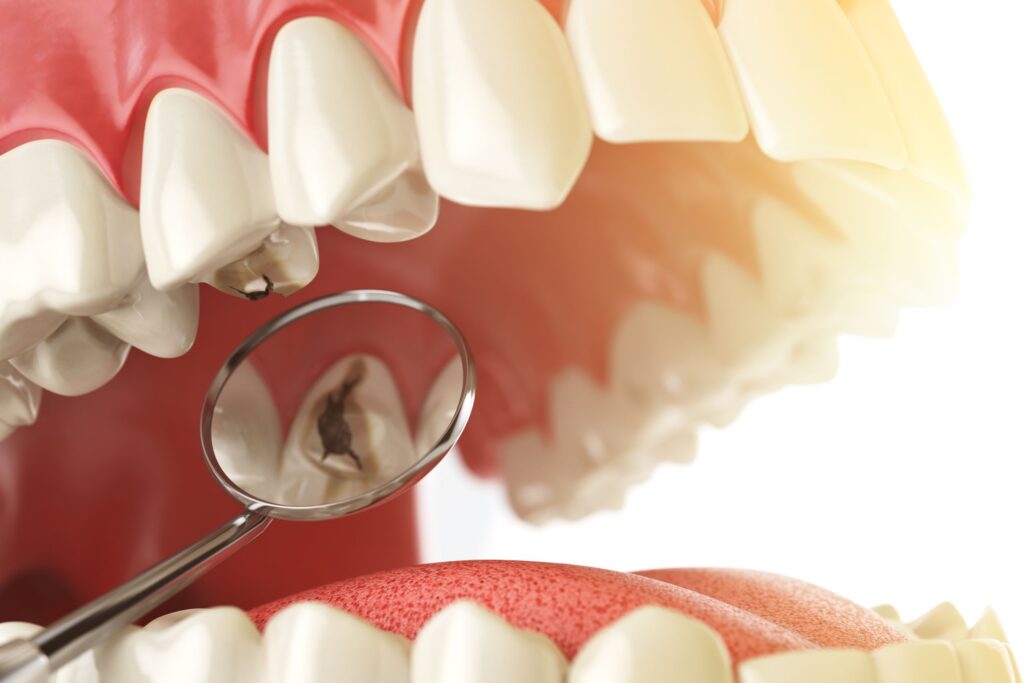“No, you can’t have more candy. You’ll get cavities.”
Yes, that’s your mother speaking, and she’s said that since you were 2.
So have ours. We’ve all heard about tooth decay since we could chew, but many of our patients still have questions about cavities. And that’s OK. We love to answer them!
It gives us a chance to pull out those nifty models of teeth and play with them.
Following are some of the frequently asked questions about cavities along with the answers we typically give our patients.
1. What are cavities?
A cavity is a hole in your tooth, typically caused by tooth decay. A cavity may be referred to as “dental caries” or in general as tooth decay.
2. How do cavities form?
When you consume sugar, it combines with the bacteria in plaque to form acids. The stickiness of the plaque keeps these acids attached to your teeth, which eventually breaks down the enamel.
3. Can you get decay on any tooth?
Yup!
4. Then why are you most likely to get cavities at your back teeth?
That’s where you chew, and it can be harder to brush thoroughly back there. Additionally, when you drink water, you’re more likely to wash away acids on the front of your teeth.
5. How do dentists fill cavities?
If you need to ask that question, you’re off to a good start! Many people experience a cavity filling procedure when they’re toddlers, but we’re trying to fight that tradition with education.
Still, if you are scheduled for your first dental filling, here’s what you can expect:
- You will have a consultation with Dr. Mike, either on the same day or a prior date. During the consultation, Dr. Mike or a dental assistant will obtain images of the tooth using one or more forms of technology, such as digital X-rays.
- On the day of the procedure, if numbing is needed, we will apply a strong topical anesthetic gel on the gum and then gently use a syringe to insert a numbing agent at the gums and tissues around the applicable tooth.
- Then Dr. Mike will use various tools as necessary to clean out the decay.
- A tooth-colored composite resin will be applied to fill the tooth, and the resin will be hardened.
6. I thought dental fillings were silver. Is that not the case anymore?
In the past, dentists used silver amalgam fillings or gold-colored fillings. Some dentists still offer these possibilities, but today most modern dental offices lean toward using only white composite resin fillings. That’s the case here in our Rochester Hills dental office, where we focus on not only improving the structure of your teeth but their appearance as well.
You may also be able to get porcelain fillings in some dental offices. Those fillings are incredibly strong, but they tend to be the most expensive and are difficult to repair if they chip.

A cavity is essentially a hole in a tooth, as depicted in this graphic.
7. What happens if I ignore the cavity? I’m not really feeling pain or getting food trapped in there.
You’re not feeling it now. But it will get worse and you’ll feel it later. Trust us. We can just about guarantee that. More importantly, the cavity may start to affect nearby teeth or eat away at the tooth so much that you will need a more significant dental procedure, such as a root canal or extraction.
8. How much does it cost to fill a cavity?
Composite resin fillings cost between $90 and $250. Silver amalgam fillings cost less, but not by much.
9. Will insurance cover the procedure?
We can’t make any promises about what insurance companies will or won’t cover. However, generally most dental insurance providers will pay for most, if not all, of a dental filling procedure. Contact them to find out for sure.
10. Will the filling last forever, or will I need to get it replaced?
A little of both.
Officially, dental fillings are expected to last about 10 years, but many times they never need to be replaced at all.
On the other hand, normal wear-and-tear, trauma, or tooth grinding can cause a filling to chip, so you will need to get it replaced in that case. Another factor is that if you did get silver amalgam fillings, the color may wear away and seep into your real tooth over time, causing the entire tooth to appear bluish. That’s a sign that it needs to be replaced — and a great opportunity to modernize with a white filling or even a porcelain crown.
11. How long will the dental filling procedure take?
From the time you lie down in our relaxing chairs to the time you head home, expect to spend about an hour here — give or take depending on various factors. That hour includes numbing up your mouth, talking with Dr. Papastamatis, having X-rays taken if needed, rinsing your mouth out after the procedure, and so on.
12. How long will my mouth be numb?
It will be numb for two to five hours, possibly less. Most people feel back to normal within a few hours.
13. I don’t want to give up sweets or acidic foods. How can I prevent cavities anyway?
We’re not trying to make anyone miserable here. You can continue to enjoy dessert, fruits, and your favorite beverages. Just don’t overdo it, and make sure you brush your teeth twice per day and floss daily.
If you do eat sweets, try to brush your teeth soon afterward, but wait at least a half hour after consuming the sugars. If you brush too quickly afterward, you might merely spread the sugars around. Try to drink water after eating in order to rinse away surface sugars and acids before you brush.
14. Do I have to do anything before the procedure?
Other than making sure your schedule is free for the procedure and an hour or two afterward, not really. Just come on in.
15. What can I expect during the recovery period? Will I be in pain? Is there anything I should avoid doing?
As noted above, your mouth will be numb for a short time afterward. You also might want to avoid eating anything hard on that tooth for a few hours.
After the anesthetic wears off, you might feel slight discomfort in that area, but it usually isn’t too bad. If you are concerned about pain you might feel afterward, let us know. We’ll give you suggestions for pain relief remedies, such as over-the-counter painkillers.
If you do experience unusual pain or other side unexpected side effects, call our office as soon as possible.

